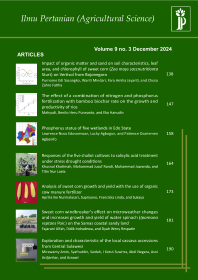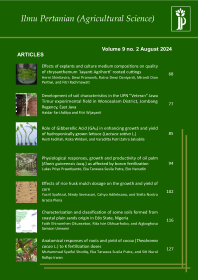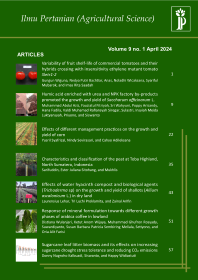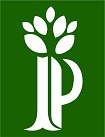Genetic Variability of Rice Pericarp Color Parameters and Total Anthocyanine Content of Eleven Local Black Rice and Their Correlation
Kristamtini, Taryono, Panjisakti Basunanda, dan Rudi Hari Murti(1*)
(1) Balai Pengkajian Teknologi Pertanian (BPTP) Yogyakarta
(*) Corresponding Author
Abstract
ABSTRACT
Black rice starts to be consumed as functional food due to high anthocyanine content which functioned as an antioxidant. The different in an existing name is predicted due to the pericarp color differences which are from light to heavy black. It is therefore that morphological characteristics observation of pericarp color is required. This study aimed to identify genetic variability of 11 Indonesian local cultivar of black rice based on pericarp color parameters and total anthocyanine content, even their correlations. L*, a*, b* color parameters were observed using Chroma Meter - Konica Minolta – Minolta CM-2006, and white standard color was used for calibration, whereas total anthocyanine content was measured based on absorbent value of grinded rice grains using 535 nm wavelength of spectrophotometer. Color parameters and total anthocyanine content data were analyzed using analysis variance to estimate Genetics Variability Coefficient and cluster analysis to know the similarity among these local cultivars of black rice. The result showed that b* color variable and total anthocyanine content indicate broad genetic variability, whereas L* and a* color variables depict narrow genetic variability. There were 3 different groups of black rice based on L*, a* and b* color parameters and total anthocyanine content. These were Cempo ireng; Banjarnegara, Banjarnegara-Wonosobo, Magelang berbulu, Magelang tak berbulu, Nusa Tenggara Timur and Pari Ireng; and Sragen, Jlitheng, Bantul and Melik groups. Positive significant correlation was observed between L*, a*, b* color parameters, and there was negative significant correlation between total anthocyanine content and L*, a*, dan b* color parameters.
Key words: genetic variability, pericap colour parameters, total anthocianin content, local black riceFull Text:
PDFReferences
Bao, J.S., Y. Cai, M. Sun, G. Wang, H. Corke. 2005. Anthocyanins, flavonols, and free radical scavenging activity of Chinese bayberry (Myrica rubra) extracts and their color properties and stability. Journal of Agricultural Food Chemistry 53 (6): 2327-2332
Battacharjee, P., R.S. Shinghal, and P.R. Kulkkarno. 2002. Basmati rice : A review. Int. J. Food Sci. Tech. 37 (1): 1-12.
Bahar , H., dan S. Zen. 1993. Parameter genetik pertumbuhan tanaman, hasil dan komponen hasil jagung. Zuriat 4 (1): 4-7.
Chaudhary, R.C. 2003. Speciality rices of the world : Effect of WTIO and IPR on its production trend and marketing. J. Food Agric. Env. 1 (2) : 34 -41.
CIAT. 1993. Biotechnology Research Unit. Annual Report, Cali, Colombia International Potato Centre (CIP), Asian Vegetable Research and Development Centre (AVRDC), International Board for Plant Genetic Resources (IBPGR), 1991. In: Z. Huaman (ed.), Descriptors for Sweet Potato, pp: 43–130. IBPGR, Rome, Italy
Fehr, W.R. 1987. Principles of Cultivar Development. Vol 1. Macmillan Publishing Co. New York. pp. 536
Garcia, E., M. Jamilena, J.I. Alvarest, T. Arnedo, J.L.Oliver, and R. Lozano. 1998. Genetic relationships among melon breeding lines revealed by RAPD marker and agronomic traits. Theor. Appl. Genet. 96: 878-887.
Greech, J.L. and P.L. Reits. 1971. Plant Germplasm Now and Tomorrow. In: N.C. Brady (ed). Advance in Agronomy. Academy Press.
Hallauer, A.R., and J.B. Miranda. 1988. Quantitative Genetics in Maize Breeding. Iowa State University Press. Pp. 468
Jin., L., P. Xiao, Y. Lu, Y.F. Shao, Y. Shen, J.S.Bao. 2009. Quantitative trait loci for brown rice color, phenolics, flavonoid contents, and antioxidant capacity in rice grain. Cereal Chem. 86: 609-615.
Julisaniah, N. I., L. Sulistyowati, dan A. N. Sugiharto. 2008. Analisis kekerabatan mentimun (Cucumis sativus L.) menggunakan Metode RAPD-PCR dan isozim. Biodiversitas. 9 (2): 99-102.
Karuri, H.W., E.M. Ateka, R. Amata, A.B. Nyende, A.W.T. Muigae, E. Mwasame, and S.T. Gichuki. 2010. Evaluating diversity among Kenyan sweet potato genotypes using morphological and SSR markers. Int. J. Agric. Biol. 12: 33-38.
Knight, R. 1979. Quantitative genetic statistics and plant breeding. In: R. Knight (ed). Plant Breeding, Brisbane. 41-76p.
Kaplan, D.R. 2001. The science of plant morphology : definition, history and role in modern biology (On line). American Journal of Botany 88 (10) : 1711 – 1741. http://www. American Journal of Botany.com/journal/morphology/v88.
Kovach, W.L. 2007. Kovach computing services. MVSP Plus Version 3.1 User’s Manual. Publish by Kovach Computing Services. Pentracth, Wales. U.K. Printed. Sept 2007. p. 137.
Kristamtini. 2009. Keragaan Beras Hitam sebagai Sumberdaya Genetik Lokal. Prosiding Risalah Aplikasi Paket Teknologi “Mendukung Hari Pangan Sedunia”. BPTP Yogyakarta.
Kristamtini. 2008. Penampilan Cempo Ireng sebagai Sumberdaya Genetik Lokal Beras Hitam. Prosiding Seminar Nasional. Pengembangan Produk Berbasis Sumber Pangan lokal untuk Mendukung Kedaulatan Pangan. Program Studi Teknologi Hasil Pertanian Fak. Agroindustri. Universitas Mercu Buana Yogyakarta Bekerjasama dengan Perhimpunan Ahli Teknologi Pangan (PATPI) Yogyakarta dan Lembaga Ilmu Penegtahuan Indonesia (LIPI). Yogyakarta. 18 Desember 2008.
Li, P., Y. Yumwen, X. Sum, and J. Han. 2009. Using microsatellite (SSR) and morphological markers to assess the genetic diversity of 12 alfalfa (Medicago sativa spp. falcata) population from Eurasia. Afr. J. Biotechnol. 8(10): 2102-2108.
Liu, B. 1998. Statistical Genomics: Linkage, Mapping, and QTL analysis. CRC Press. Boca Raton
Marzuki, I., M.R. Uluputty, A.A. Sandra, dan S. Memen. 2008. Karakterisasi morfoekotipe dan proksimat pala Banda (Myristica fragrans Houtt). Bul. Agron. 36(2): 145-151.
Mangoendidjojo, W. 2003. Dasar-dasar pemuliaan tanaman. Yogyakarta : Kanisius.
Moedjiono dan M.J. Mejaya. 1994. Variabilitas genetik beberapa karakter plasma nutfah jagung koleksi Balittan Malang. Zuriat: 5 (2): 27-32.
Rimoldi, F., P.D.V. Filho, M.V. Kvitschal M.C. Gonzalvesvidigal, A.J. Pioli, S.M.A.P. Prioli, and T.R. dA Costa. 2010. Genetic divergence in sweet cassava cultivars using morphological agronomic traits and RAPD molecular markers. Brazilian Archives Biology and Technology 53(6): 1447-1487.
Ryu,S.N., S.Z. Park and C.T. Ho. 1998. High performances liquid chroomatographic determination of anthocyanin pigments in some varieties of black rice. Journal of food and Drug Analysis 6 : 1710-1715.
Shen, Y., L. Jin, P. Xiao, Y. Lu, J.S. Bao. 2009. Total phenolics, flavonoids, antioxidant capacity in rice grain and their relations to grain color, size and weight. Journal of Cereal Science 49: 106-111.
Simmonds, N.W. 1986. Evaluation of Crops Plant. Longman Scientific & Technical. England. 339 pp
Singh, R.K. and B.D. Chaudhary. 1979. Biometrical Method in Quantitative Genetics Analysis. New Delhi : Kalyani Publ.
Sofro, A.S.M. 1994. Keanekaragaman Genetik. Yogyakarta: Andi Offset.
Solouki, M.,H., Mehdikhani, H. Zeinali dan A.A. Emamjomeh. 2008. Study of genetic diversity in Chamomile (Matricaria chamomilla) based on morphological traits and molecular markers. Sci. Hortic. 117: 281-287.
Suhartini, T dan D. Suardi. 2010. Potensi beras hitam lokal Indonesia. Warta Penelitian dan Pengembangan Pertanian 32(1):9-10.
Takashi I, X. Bing , Y. Yoichi , N. Masaharu and K. Tetsuya. 2001. Antioxidant activity of anthocyanin extract from purple black rice. Journal of Medicinal Food 2001; 4 : 211 – 218.
Talebi, R., F. Fayaz, M. Mardi, S. M. Pirsyedi, and A.M. Naji. 2008. Genetic relationships among chickpea (Cicer arietinum) elite lines based on RAPD and agronomic markers. International Journal of Agricultural Biology 10(3): 301-305.
Yafang, S., Z. Gan and B. Jinsong. 2011. Total phenolic content and antioxidant capacity of rice grains with extremely small size. African Journal of Agricultural Research 6 (10) : 2289-2293.
Yodmanee, S., T.T. Karrila, and P. Pakdeechanuan. 2011. Physical, chemical and antioxidant properties of pgmented rice grown in Southeern Thailand. International Food Research Journal 18 (3): 901-906.
Article Metrics
Refbacks
- There are currently no refbacks.
Ilmu Pertanian (Agricultural Science) ISSN 0126-4214 (print), ISSN 2527-7162 (online) is published by Faculty of Agriculture Universitas Gadjah Mada collaboration with Perhimpunan Sarjana Pertanian Indonesia (PISPI) and licensed under a Creative Commons Attribution-ShareAlike 4.0 International License.













